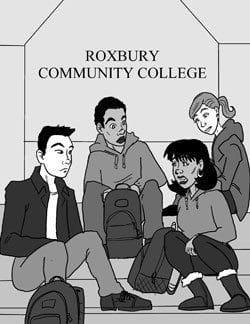
RCC thrives with community support
| Editor’s note: The report, “The case for Community Colleges,” proposes consideration of a merger between Bunker Hill and Roxbury Community colleges. |
President Barack Obama has decreed that community colleges will play a major role in the enhancement of American education. The nation needs a better educated work force in order to be competitive in the global economy. The Boston Foundation commissioned a study on community colleges in Massachusetts to determine what changes might improve their success.
The researchers analyzed the systems in those states that are considered to be most effective: Virginia, North Carolina, Tennessee, Arkansas, Washington and Ohio. They then proposed how the 15 community colleges in Massachusetts might benefit from adopting the successful strategies of other states. The final report is entitled “The Case for Community Colleges: Aligning Higher Education and Workforce Needs in Massachusetts.”
Community colleges have a dual goal. One is to prepare their graduates for immediate entry into the work force. The other is to provide an opportunity for more advanced academic study. The report offers many useful suggestions but it seems to de-emphasize the most significant problem of community colleges — a large number of students are not academically prepared for post-secondary education.
At Roxbury Community College (RCC), for example, 40 percent of the students are taking remedial English and 60 percent are taking remedial Math. The students have to pay tuition and they get no academic credit for successfully completing the courses, this is not a good deal for most students who are accustomed only to free public education. Only the most highly motivated are willing to pay for a transaction that offers no prize whether you finish or drop out.
A hard-nosed critic might argue that if the students had done their homework in high school they would not now need remedial courses. Indeed that’s true. But if they were really good students in high school, they would also not need a community college. It would be most advantageous for them to go to a four-year college.
Judging from the high number of students at RCC who need remedial education, it is reasonable to conclude that a major objective of the school is to enroll and retain a substantial number of students who were not outstanding academic successes in high school. Strategies for more efficient administration and appealing curricula will have little importance if the students do not come and remain enrolled until graduation.
One way to motivate students is to modify the financial risk. Students should be required to invest in their own education, but it would be helpful to find a way to roll over a portion of the tuition for remedial courses that they complete on time as a partial payment for future substantive courses. In this way students would be betting on themselves — betting that they can do it.
Most important of all, however, is to enliven an awareness in the community of the value of education. Although we are surrounded by Harvard, Boston University, Simmons and Northeastern, the Roxbury institution of higher learning is RCC. Activists fought hard on Beacon Hill to create RCC in 1968. Its location moved from Grove Hall, to the convent at 460 Blue Hill Ave. then to 420 Blue Hill Ave., to Boston State College on Huntington Avenue, and finally to the Columbus Avenue site in 1988.
There have been some political problems in the past, but community leaders have steadfastly supported the institution against threats of alien takeovers. The authors of the report must be unaware of this history when they propose a merger between RCC and another institution. Like other institutions, RCC must make improvements, but it must continue to stand as an independent symbol of the importance of higher education in Roxbury.






